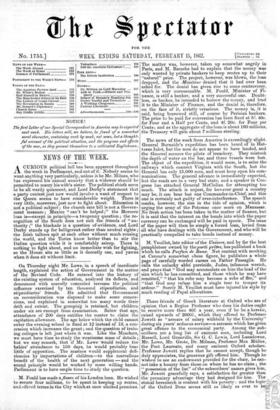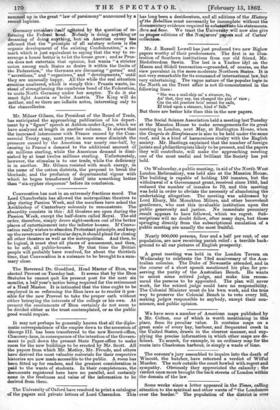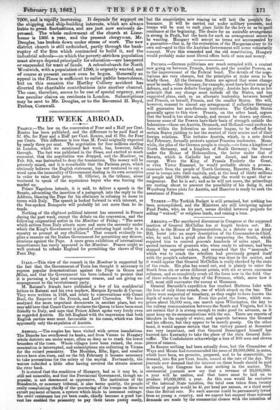NEWS OF THE WEEK.
C1JRIOl7S political lull has been apparent throughout the week in Parliament, and out of it. Nobody seems to want anything very particularly, unless it be Mr. Milnes, who has expressed his- annual anxiety that a widower should be permitted to marry his wife's sister. The political chiefs seem to be all warily quiescent, and Lord' Derby's statement that a party contest just now would involve a want of respect to the Queen seems to have considerable weight. There is very little, moreover, just now to fight about. Education is not a political subject ; the church rate bill is not a Govern- ment measure ; Mexico "can't be helped ;" the Morocco loan is—except in principle—a twopenny question ; the re- cognition of the South does not suit the friends of "au- thority ;" the blockade is a question of-evidence, and Lord Derby stands up for belligerent rather than neutral rights ; the Irish talkers spit at each other without much rousing the world, and the Tories know better than to stir the Italian question while it is comfortably asleep. There is nothing to fight about, and no immediate wish for fighting, so the House sits as little as it decently can, and yawns when it does sit without limit.
On Thursday night Mr. Lowe, in a speech of inordinate length, explained the action of Government in the matter of the Revised Code. He entered into the history of the existing system of education, analyzed its defects, and denounced with scarcely concealed sarcasm the political influence exercised by ten thousand stipendiaries, and stipendiaries' friends. He admitted that Government on reconsideration was disposed to make some conces- sions, and explained in somewhat too many words their drift and extent. The groupink is retained, but children under six are exempt from examination. Below that age, attendance of 200 days entitles the master to claim the capitation allowance. The age below which the child cannot enter the evening school is fixed at 12 instead of 18, a con- cession which increases the grant ; and the question of train- ing colleges is left just where it was. Like the Members, we must have time to study the wearisome mass of details ; but we may remark, that if Mr. Lowe would reduce the babies' attendance to 150 days, he would probably hear little of opposition. The masters would supplement defi- ciencies by importations of children—to the marvellous benefit of the health of the next generation — and the sound principle would be worked by more willing hands. Parliament is to have ample time to study the question.
M. Fould has made a fiasco of his London loan. He wished to secure four millions, to be spent in keeping up rentes, and oared terms in the City which at once elicited promises. The matter was, however, taken up somewhat angrily in Paris, and M. Baroche had to explain that the money was only wanted by private bankers to keep mutes up to their "natural" price. The project, however, was blown, the loan dropped, and the Mimiteur denied that it had ever been asked for. The denial has given rise to some controversy, which is very unreasonable. M. Fould, Minister of Fi- nance, is still a banker, and a very successful one. Doubt- less, as banker, be intended to borrow the money, and lend it to the Minister of Finance, and the denial is, therefore, on the face of it, strictly veracious. The money is, it is said, being borrowed still, of course by Parisian bankers. The price to be paid for conversion has been fixed at 5f. 40c. for Four and a Half per Cents, and 4f. 20c. for Four per Cents ; and as the aggregate of the loan is about 160 millions, the Treasury will gain about 7 millions sterling.
The news of the week from America is exceedingly slight. General Burnside's expedition has been heard of in Hat- teras Inlet, but the men do not appear to have landed, and the General accuses the pilots of treachery. They mistook the depth of water on the bar, and three vessels were loot. The object of the expedition, it would seem, is to seize the railways which connect Virginia with the South, but the General has only 15,000 men, and must keep open his com- munications. The general advance is immediately expected, but the roads are in a very bad state, and a speaker in Con- gress has attacked General McClellan for attempting too much. The attack is unjust, for however great a country may be, it can bear but one Commander-in-Chief, and this one is certainly not guilty of over-interference. The speech marks, however, the rise in the tide of opinion, which is urging the army of the Potomac once more on Manassas. No fresh action has been taken in the matter of finance, but it is said that the interest on the bonds into which the paper currency can be exchanged will be paid in specie. The issue of the paper will then be simply a forced loan, levied from all who have dealings with the Government, and who will be practically compelled to take bonds instead of money.
M. Veuillot, late editor of the Uniimrs, and by far the best pamphleteer owned by thepartipretre, has published a book which he calls Paifinn de Rome. Not content with mocking at Cavour's somewhat obese figure, he publishes a whole page of carefully worded curses on Father Passaglia. He mils the unlucky abbe parricide, Judas, infamous wretch, and prays that "God may accumulate on him the load of the sins which he has committed, and those which he may have remitted," "that his robe may become a robe of ftre," and "that God may refuse him a single tear to temper its ardour." Surely M. Veuillot must have injured his style by much reading of Papal allocutions.
Those friends of Greek literature at Oxford who are of opinion that a Regius Professor who does his duties ought to receive more than 40/. a rear, even if he be a heretic, raised upwards of 20001., which they offered to Professor Jowett as "arrears of salary withheld by the University" during six years' arduous service—a sarcasm which has given great offence to the economical party. Among the sub- scribers are a long list of eminent men, including Lord Russell, Lord Granville, Sir G. C. Lewis, Lord Lansdowne, Mr. Lowe, Mr. Grote, Dr. Milman, Professor Max Muller,. the Poet Laureate, and many eminent Oxford scholars. Professor Jowett replies that he cannot accept, though he- duly appreciates, the generous gift offered him. Though he wished to see an endowment provided for the chair, he can- not take a bounty from those on whom he has no claim ; the "possession of the list" of the subscribers' names gives him, Mr. Jowett gracefully says, a satisfaction far greater than the pecuniary advantage they had designed for him. The stoical heresiarch is content with his poverty : and the logic.- c, of the Oxford Dons seems still as likely as ever, to summed up in the great "law of parsimony" announced by a recent logician.
Germany considers itself atated by the question of re- forming the Federal bond. 1obody is doing anything or dreaming of doing anything, but an Austrian envoy has affirmed that the principle of all salutary reform is the organic development of the existing Confederation," a re- mark which is just equivalent to saying that the way to re- arrange a house better is to let the house grow; and as Prus- sia does not entertain that opinion, but wants "a stricter union among such States as desire it within the limits of the Federation," the Germans are discussing "germs" and "accretions," and " organisms " and "developments," until they. are unusually happy. this while the real situation wemains unaltered, which is simply this : Prussia wants, in- stead of strengthening the cumbrous bond of the Federation, to unite North Germany under her sceptre. To do it she must fight Austria or bribe Austria. The King will do neither, and so there are infinite notes, interesting only to the chancelleries.
Mr. Milner Gibson, the President of the Board of Trade, has anticipated the approaching publication of his depart- ment by a "figure" speech at Ashton-under-Lyne, which we have analyzed at length in another column. It shows that the increased intercourse with France caused by the Com- mercial Treaty may, next year, in some sense diminish the pressure caused by the American war nearly one-half, by causing in France a demand to the additional amount of six millions sterling, while the American demand is dimi- nished by at least twelve millions sterling. Unfortunately, however, the stimulus is to one trade, while the deficiency is in another. Mr. Gibson resisted with much energy, in the name of the cotton districts, the proposal to break the blockade, and the profusion of departmental vigour with which he began transformed itself into something better than "six-cypher eloquence" before its conclusion.
Convocation has met in an extremely fractious mood. The Lord Chamberlain has allowed the metropolitan theatres to play during Passion Week, and the members have asked the Archbishop of Canterbury solemnly to remonstrate. The absurdity consists in this : All theatres are open during the Passion Week, except the half-dozen called Royal. The old order, therefore, simply drove sight-seekers out of the better places of entertainment into the inferior houses. If Convo- cation really wishes to abandon Protestant principle, and keep up the reverence for particular days,it should plead for closing all other theatres as well as the metropolitan. And then, to be logical, it must shut all places of amusement, and then, to be safe, all public-houses. By that time the British people will probably have resolved, for about the thirtieth time, that Convocation is a nuisance to be brought to a sum- mary close.
The Reverend Dr. Goodford, Head Master of Eton, was elected Provost on Tuesday last. It seems that by the Eton Statutes he cannot quit his present post for the next six months, a half year's notice being required for the retirement of a Head Master. It is intimated that the time ought to be employed in so reforming the Eton laws as to render it pos- sible for the new Provost to take the proper oath without either betraying the interests of the college or his own. At present the emoluments of Eton certainly do not seem to be divided either as the trust contemplated, or as the public good would require.
It may not perhaps be generally known that all the diplo- matic correspondence of the empire down to the accession of George III. has been transferred to the new Record-office, Chancery-lane, in consequence of the intention of the Govern- ment to pull down the present State Paper-office to make room for the new buildings to be erected by Mr. Scott. All the papers from which Mr. Motley, Mr. Froude, and others have derived the most valuable materials for their respective histories are now made accessible to the public. A room has been fitted up for readers, and the greatest consideration is paid to the wants of students. In their completeness, the documents registered here have no parallel, and certainly none in the freshness and value of the information to be derived from them.
The University of Oxford have resolved to print a catalogue of the papers and private letters of Lord Clarendon. This has long been a desideratum, and all editions of the History of the Rebellion must necessarily be incomplete without the documentary evidence required to eubstantiate his statements. Sero sed bene. We trust the University will now also give us proper editions of the Nonjurors' papers and of Cartes' collection.
Mr. J. Russell Lowell has just produced two new Biglow papers worthy of their predecessors. The first is an illus- tration of Southern institutions from our old friend, Mr. Birdofreedom Sawin. The last is a Yankee idyl on the Mason and Slidell transaction—grounded, of course, on the view prevalent in the more moderate Northern States. It is not very remarkable for its command of international law, but very entertaining. The vague nature of the popular logic in the North on the Trent affair is not ill-concentrated in the following lines :
"She was a mail-ship an' a steamer, In, An' thet, they say, hez changed the pint o' view; Cos the old practice behf meant for sails, Ef tried upon a steamer, kind o' fails."
But there are better hits than this in the new papers.
The Social Science Association held a meeting last Tuesday at the Mansion House to make arrangements for its great meeting in London, next May, at Burlington House, when the Congres de Bienfaisance is also to be held under the same roof, and in a kind of harmonious rivalry with the English society. Mr. Hastings explained that the number of foreign jurists and philanthropists likely to be present, and the papers they will contribute, will make the approaching meeting one of the most useful and brilliant the Society has yet held.
On Wednesday, a public meeting, in aid of the North-West London Reformatory, was held also at the Mansion House. The building is capable of holding 150 inmates, but the withdrawal of a Government grant, received since 1855, had reduced the number of inmates to 70, and this meeting was held in order to obviate the necessity of abandoning the undertaking altogether. The meeting was addressed by Lord Ebury, Mr. Monckton Milnes, and other benevolent gentlemen, who cast this invaluable institution upon the public generosity and justice. No immediate pecuniary result appears to have followed, which we regret. Sub- scriptions will no doubt follow, after many days, but those springing directly from the subscriptional emulation of a public meeting are usually the most fruitful.
Nearly 900,000 persons, four and a half per cent. of our population, are now receiving parish relief: a terrible back- ground to all our pictures of English prosperity.
A great meeting was held in the London Tavern on Wednesday to celebrate the 73rd anniversary of the Aus- tralian colonies. The Duke of Newcastle attended, and in the course of a short speech mentioned his plan for pre- serving the purity of the Australian Bench. He wants to select some retired judge, and make him recom- mend the persons to be appointed. The plan will never work, for the retired judge could have no responsibility. The Colonial Minister must do his bwn work, and the true way to preserve the Colonial Bench is to veto every bill, making judges responsible to anybody, except their con- science, and public opinion.
We have seen a number of American maps published by a Mr. Colton, one of which is worth mentioning in this place, from its peculiar value. It contains maps on a great scale of every bay, harbour, and frequented creek in the United States, drawn in the clearest manner, and sup- plying the precise information in which other maps are de- ficient. To search, for example, in an ordinary map for the route into Charleston harbour, is simply a waste of time.
The coroner's jury assembled to inquire into the death of Wincott, the butcher, have returned a verdict of Wilful Murder. The mob outside the court howled with regret and sympathy. Obviously they appreciated the calamity : the verdict once more brought the back streets of London within the domain of the law.
Some weeks since a letter appeared in the Times, calling attention to the spiritual and other wants of" the Londoners over the border." The population of the district is over
7000, and is rapidly increasing. It depends for support on the shipping and ship-building interests, which are always liable to great fluctuations, and are just now seriously de- pressed. The whole endowment of the church at Lime- house is 1301. a year, and the present clergyman, Mr. Douglas, has broken down under stress of work. The new district church is still unfinished, partly through the bank- ruptcy of the firm which contracted to build it, and the industrial schools—on which the poverty-stricken population must always depend principally for education—are hampered or suspended for want of funds. A school-church for North Woolwich, with a population of 1200, is urgently wanted, and of course at present cannot even be begun. Generally an appeal in the Timer is sufficient to enlist public benevolence, but on this occasion the Hartley Colliery accident has diverted the charitable contributions into another channel. The case, therefore, seems to be one of special urgency, and has peculiar claims on residents in London. Subscriptions may be sent to Mr. Douglas, or to the Reverend H. Boyd, Probus, Cornwall.
































